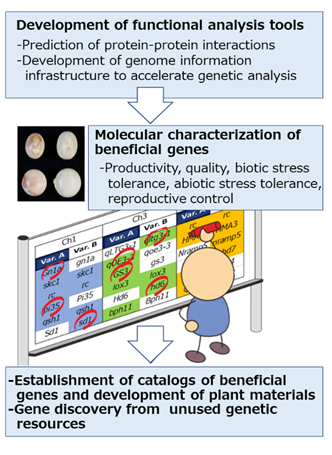In order to maintain and improve agricultural productivity in the face of environmental changes such as global warming, it is necessary to have a technological foundation that maximizes the functions of crops. One way is to utilize the diverse functions of various genetic resources.
Therefore, in order to make effective use of various genetic resources, we will collect genome information, develop mutant populations, conduct genetic analyses such as genome-wide association studies (GWAS), analyze the functions of beneficial genes and the interactions between proteins that accelerate the analysis. Then we will develop technologies to estimate the effects of amino acid sequence differences on their functions, and ultimately build mechanisms for in silico (on computer) evaluation.
Through the development of these tools and their evaluation, we evaluate the functions of genes involved in yield, quality, disease resistance, stress resistance, hybrid vigor, etc., and aim to build a catalog of genes that contribute to the development of cultivars, and build a mechanism to identify rare useful genes in genetic resources and mutants according to needs.

Members
- HORI Kiyosumi (Leader)
- KOBAYASHI Fuminori (Deputy Leader)
- Shenton Matthew
- TANAKA Nobuhiro
- YAMAMOTO Eiji
- FUJII Eriho
- SAKURAI hiroki
- KAGA Akito
- KOMURA Shoya
- OKADA Ryoma
- HIRABAYASHI Hideyuki




